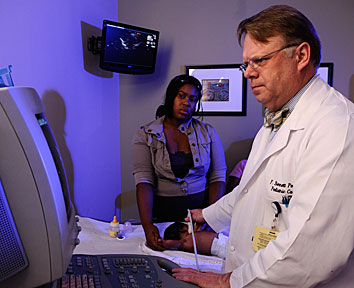Adult and pediatric cardiology patients now have access to an expanded practice in the new suites of the UAB's Alabama Congenital Heart Center's (ACHC).
 |
"This suite was designed to be patient-centric, and we now have the capability to see more patients and see them more quickly than before," says Yung Lau, M.D., associate division director of pediatric cardiology. "We have been able to expand our commitment to perform all common non-invasive cardiology tests in one place, and it makes a patient's visit comprehensive and efficient."
The ACHC moved from its offices in the Old Hillman Building in February into its new 14,400-square-foot offices in the Women's and Infants Center.
"We've increased the number of patients we see by 50 percent and are able to see patients much more quickly," Lau says. "Our goal, which we've met, is to see any urgent new patient the day of referral and any routine new patient is seen within two weeks. Another goal is to have our signed dictated note to the referring physician within two business days. We want to be thorough and efficient in our care."
The ACHC also has completed a time study, which measured the amount of time each patient spends in the office from check-in until they leave. The average time is 65 minutes, which includes check-in, echocardiogram, chest X-ray, electrocardiogram (EKG) and a doctor's consultation.
The increased space also enables cardiologists to perform exercise testing and pacing and defibrillator evaluation and follow-up as needed.
"Our patients enter one place and have every common noninvasive cardiac test they need performed right here," Lau says. "We can perform all of these tests and talk to the family about the results at one time."
Range of specialties
Seven cardiologists with a range of specialties see patients in the ACHC, and an eighth will begin in July. They will continue to treat an array of heart ailments, including:
- Cardiac rhythm disorders (fetus, newborn, child to adult)
- Congenital heart disease of all forms in infants, children, adolescents and adults
- Genetic abnormalities associated with heart disease
- Heart failure/heart transplantation
- Pulmonary hypertension
- Suspected congenital heart disease in the fetus
Interventional cardiologists also are able to perform the most up-to-date procedures in the ACHC, including implanting a device to close a hole between the two upper chambers between the two atriums - a common problem among their younger patients. "We now have a device we can use to close the hole without having to do open heart surgery in 80 percent of patients," Lau says.
Another new procedure available soon will enable physicians to place valves with a catheter without having to perform surgery, and Lau says more surgical procedures now are available using heart catheterization.
If surgery is necessary, pediatric cardiovascular patients can be seen by cardiothoracic surgeons in the new facility.
"Before we had to send them to Kirklin Clinic because we didn't have the room," Lau says. "Now we have consolidated the care of these patients. Whether they need a surgical outpatient visit or cardiology outpatient visit, everything can be done here."
Congenital heart disease
The ability to see more congenital heart disease (CHD) patients also is important because of the growing population of those living with the disease.
Remarkable improvement in survival of patients with CHD has occurred during the past half century since reparative surgery has become commonplace. In fact, since the advent of neonatal repair of complex lesions in the 1970s, an estimated 85 percent of patients survive into adult life, according to the American Heart Association. In 2000 it was estimated that there were approximately 800,000 adults with CHD in the United States; given modern surgical mortality rates of less than 5 percent, that number is expected to continue to rise.
"Our surgeons and cardiologists have been so successful in treating these patients and keeping them alive that more and more of them are reaching adulthood," Lau says. "Most of the time, people born with malformed hearts are living full lives, and we now are caring for patients in their 40s, 50s and 60s. With our expanded capacity, we will be able to see more referrals in a timely manner and care for the expanding population of adults with congenital heart disease."
If a child in your life is in need of cardiac care, call UAB HealthFinder at 1-800-UAB-8816 to schedule an appointment with one of UAB's experienced pediatric cardiologists.